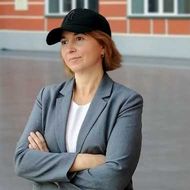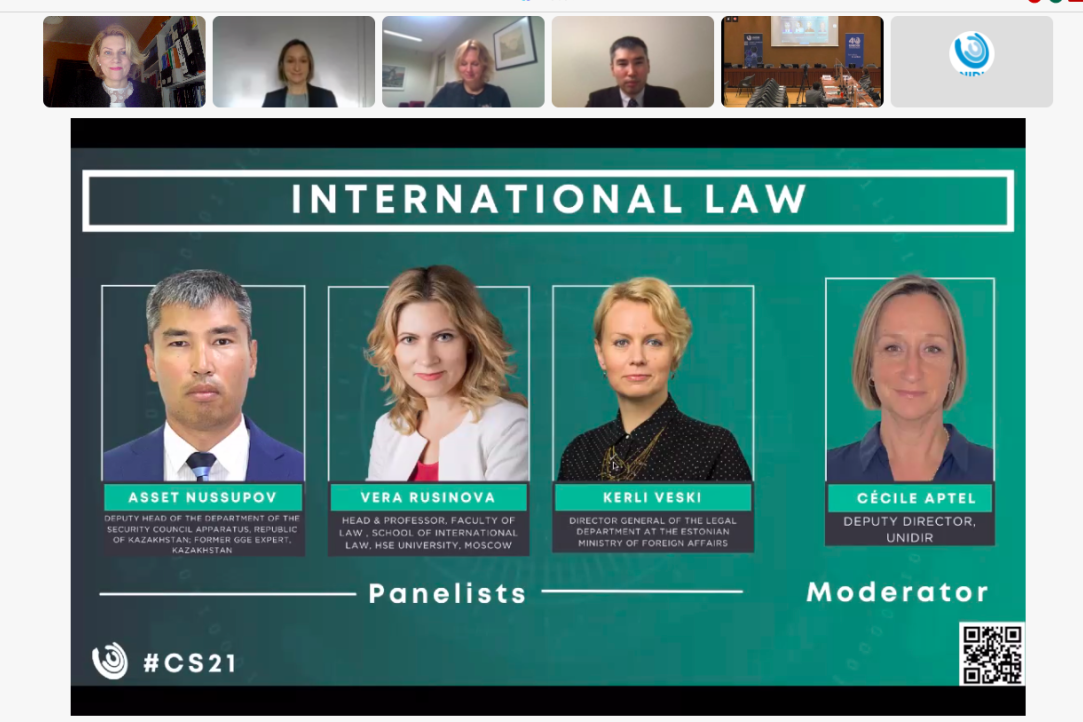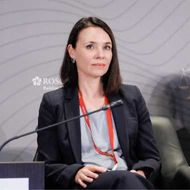- A
- A
- A
- ABC
- ABC
- ABC
- –ê
- –ê
- –ê
- –ê
- –ê
- HSE University
- Faculty of Law
- School of International Law
- News
- Vera Rusinova spoke at the UNIDIR 2021 Cyber Stability Conference: Towards A More Secure Cyberspace
-
School
- About the School
- Research
- Academics
- "HSE University Journal of International Law"
-
Research and Study Laboratories and Groups
-
Research and Study Laboratories
-
Research and Study Groups
-
- Research and Methodology Units
- HSE Research Seminar on International Law
- Ph.D. Seminar
- Undergraduate track ‘International Law’
-
Projects
-
Status: active
- Applied project «Philip C. Jessup international law moot court competition training 2023-2024»
- Applied project 2024-2025 “Preparation for the Willem C. Vis Moot Competition, season 2024-2025”
- Fundamental Research Project "Legal Mechanisms for Overcoming Inequality"
- Participation of Young Lawyers as Clerks of the International Commercial Arbitration Court at the Chamber of Commerce and Industry of the Russian Federation
- Research project: International Competition ‘Dispute Resolution in the EAEU–2024’: Preparation and Participation of the Faculty of Law's Team
-
Status: completed
-
- Staff Members
-
Educational programs
- Bachelor's Programmes
- Master's Programmes
- Doctoral School of Law
Moscow, 3 Bolshoy Trekhsvyatitelsky Pereulok, rooms 227, 228b

E-mail: svetlana.smirnova@hse.ru
Located at a crossroads of global, regional, and national interests, contemporary international law affects almost all spheres of society. The School of International Law keeps pace with significant international events and legal adjudication in order to provide hands-on education that prepares future lawyers and legal scholars for the demands of the current legal landscape. The School is at once a ‘think tank’ that provides expert analysis and a producer of top legal experts and lawyers in international law.
 The Right to Regulate in International Economic Law: Towards a General Theory with Lessons from the GATS
The Right to Regulate in International Economic Law: Towards a General Theory with Lessons from the GATS
Göttingen: Universitätsverlag Göttingen, 2024.
HSE University Journal of International Law. 2025. Vol. 3. No. 1. P. 115-127.
Vladislav Starzhenetskiy, Sabina Geydarova.
In bk.: –ù–æ–≤—ã–µ –≥–æ—Ä–∏–∑–æ–Ω—Ç—ã –º–µ–∂–¥—É–Ω–∞—Ä–æ–¥–Ω–æ–≥–æ –∞—Ä–±–∏—Ç—Ä–∞–∂–∞. –í—ã–ø—É—Å–∫ 8.. Iss. 8. 2025. Ch. 17. P. 439-461.
 MANDATORY CORPORATE HUMAN RIGHTS DUE DILIGENCE MODELS: SHOOTING BLANKS?
MANDATORY CORPORATE HUMAN RIGHTS DUE DILIGENCE MODELS: SHOOTING BLANKS?
Rusinova V., Sergei K.
Law. LAW. –í—ã—Å—à–∞—è —à–∫–æ–ª–∞ —ç–∫–æ–Ω–æ–º–∏–∫–∏, 2021

Vera Rusinova spoke at the UNIDIR 2021 Cyber Stability Conference: Towards A More Secure Cyberspace

The UNIDIR’s annual flagship conference on cyber stability convened representatives from government, industry and civil society, reflecting on the past and paving the way for the future work of the Open Ended Working Group (OEWG) on security of and in the use of information and communications technologies (ICTs) . In accordance with the General Assembly resolution 75/240, this Group acting on a consensus basis, will continue to further develop the rules, norms and principles of responsible behaviour of States and the ways for their implementation and consider initiatives of States aimed at ensuring security in the use of information and communications technologies.
One of the elements of the Open Ended Working Group's mandate is to study, how International Law applies to the use of ICTs. This question has been in focus of the confernce panel called 'International Law'. The speakers – Prof. Vera Rusinova together with Kerli Veski (Director General of the Legal Department at the Estonian Ministry of Foreign Affairs) and Asset Nussupov (Deputy Head of the Department of the Security Council Apparatus, Republic of Kazakhstan) – addressed the question of how the mandate of the Open Ended Working Group can be be leveraged to answer outstanding questions related to how International Law applies in ICT context.
In her presentation Vera Rusinova dwelved into question of how the Open Ended Working Group can go about identifying gaps in the International Law applicable to the ICT environment. She has identified two main principles that can underpin the identification of gaps: the ‘juridicalization’ of the OEWG’s work in this field and ‘ontological neutrality’. She also shared her views on the approaches to what can be regarded by the Group as a ‘gap’ in International law and how to fill in these gaps.
- About
- About
- Key Figures & Facts
- Sustainability at HSE University
- Faculties & Departments
- International Partnerships
- Faculty & Staff
- HSE Buildings
- Public Enquiries
- Studies
- Admissions
- Programme Catalogue
- Undergraduate
- Graduate
- Exchange Programmes
- Summer Schools
- Semester in Moscow
- Business Internship
-
https://elearning.hse.ru/en/mooc/
Massive Open Online Courses
-
https://www.hse.ru/en/visual/
HSE Site for the Visually Impaired
-
http://5top100.com/
Russian Academic Excellence Project 5-100
- © HSE University 1993–2025 Contacts Copyright Privacy Policy Site Map
- Edit

